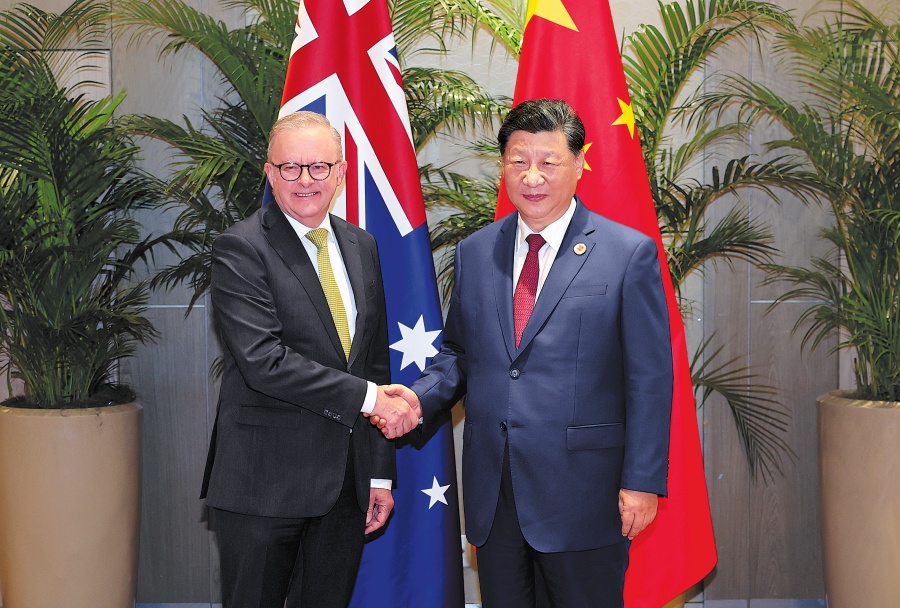Albanese has taken care to rebuild relations derailed earlier, experts say

After a period of disruption, the Australia-China relationship is back on solid ground, cemented by the recent meeting between Australia’s Prime Minister Anthony Albanese and China’s President Xi Jinping on the sidelines of the G20 summit in Rio de Janeiro, Brazil.
Both leaders reiterated their shared desire to build a mature and stable relationship.
Relations between the two countries have improved enormously following the election of a Labor government in 2022.
Analysts said Prime Minister Albanese has taken great care in rebuilding relations which were derailed by the former conservative coalition government led by then prime minister Scott Morrison.
This was echoed on Nov 26 by China’s Ambassador to Australia Xiao Qian, who said ties were “back to the right track”.
At a press briefing marking the 10th anniversary of the Australia-China comprehensive strategic partnership, Xiao said: “We experienced a difficult time for several years until two years ago. Since then, we have successfully changed that situation.”
Professor James Laurenceson, director of the Australia-China Relations Institute at the University of Technology Sydney, said relations between Australia and China are on a “solid footing”.
“Since coming to power, the Albanese government has been consistent in its relations with China, and this was further reinforced when the two leaders met at the G20,” Laurenceson said.
He said Canberra and Beijing are basically saying the same things about the bilateral relationship.
“While they acknowledged some differences, they also acknowledged areas of common interest.”
James Chin, a professor of Asian Studies at the University of Tasmania, said it is quite clear that ties between Australia and China are back to normal, and that he expects there will be “a series of bilateral meetings” following the Xi-Albanese talks last week on the sidelines of the G20 summit.
Albanese’s meeting with Xi came a year after his visit to Beijing to end the diplomatic dispute that saw billions of dollars’ worth of Australian exports to its largest trading partner blocked.
David Olsson, president and chair of the Australia China Business Council, said: “Over the past three years, Australia-China relations have transitioned from significant tensions to the best that it has been over the last decade, driven by pragmatic economic imperatives and diplomatic recalibration.”
He said the meeting between Xi and Albanese was an acknowledgment of the importance of the comprehensive strategic partnership.
“It also demonstrates that there is an enduring appetite in both Beijing and Canberra to widen and deepen areas of collaboration,” he said.
Olsson said the China-Australia Free Trade Agreement has seen mutual trade double in the last decade, growing to a record-high A$327 billion ($211.9 billion) this year. The two governments recognize external trade is vital for both economies and for the region, and Australia regularly affirms its commitment to promoting open, diversified, rules-based trade.
“We are seeing a more balanced engagement on contentious issues,” Olsson said.
“Top-level dialogues — at government, diplomatic, and business levels — provide platforms to talk through differences and find common ground for mutual benefit.
“Importantly, leaders on both sides point to the fundamental complementarity of the two countries’ economies as the bedrock of the bilateral relationship.”
Hans Hendrischke, professor of Chinese Business and Management at the University of Sydney’s business school, described the Xi-Albanese meeting as a “crucial step in separating the geopolitical discourse from the economic dialogue between Australia and China.”
“In the economic conversation, both sides have enough common interests to work together and to resolve differences constructively,” he said.
Additional reporting by Xu Weiwei.


